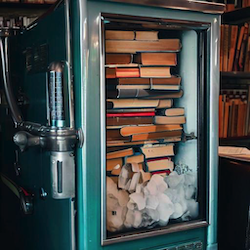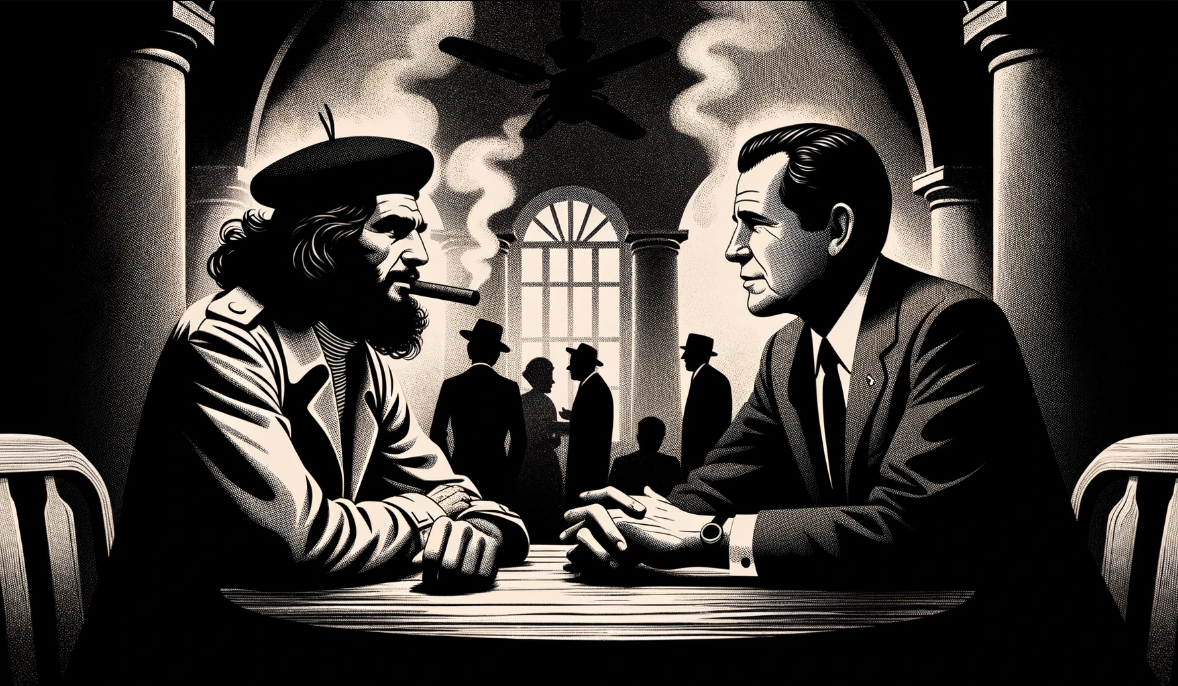In a covert maneuver orchestrated by his advisors, Richard Nixon finds himself in Havana, Cuba, a city at the heart of revolutionary fervor, where Che Guevara holds sway as one of Fidel Castro’s closest allies.
The following article explores a speculative clandestine meeting between Nixon and Guevara, held in a dimly lit, smoky room on the outskirts of Havana. Their conversation is a high-stakes ideological battle. Nixon, with his staunch anti-communist stance, tries to understand Guevara’s vision for a socialist world order. Guevara, in turn, challenges Nixon’s commitment to democracy and highlights the inequalities of capitalism.
As they debate the merits of their respective ideologies, they also reveal personal insights. Nixon’s inner conflicts and doubts about his role in history come to the fore, while Guevara’s unwavering belief in the power of the proletariat is unveiled.
Part One: The Introductions
Nixon: (leaning forward) You know, Mr. Guevara, I’ve always been intrigued by men of conviction.
Guevara: (smirking) And you, President Nixon? Are you a man of conviction?
Nixon: (pausing) I’ve had to make some tough decisions in my time, Che. Decisions that affect millions of lives.
Guevara: (leaning in) Decisions that serve the interests of a select few, perhaps?
Nixon: (nodding) I won’t deny that power can be corrupting, Mr. Guevara. But capitalism, despite its flaws, has brought prosperity to many.
Guevara: (smiling wryly) Prosperity for some, poverty for many. Your system, President Nixon, thrives on inequality.
Nixon: (leaning back) And your system, Mr. Guevara? The elimination of private property, centralized planning—how has that worked for Cuba?
Guevara: (passionately) We’ve achieved remarkable progress! Our people have access to education and healthcare, President Nixon. We’re building a society where all are equal.
Nixon: (raising an eyebrow) Equality, you say? At the expense of individual freedom?
Guevara: (pointing) Freedom that often leaves the masses oppressed, chained by poverty, and exploited by the wealthy elite.
Nixon: (smirking) The Soviet Union, China, and now Cuba—your brand of socialism is spreading like wildfire.
Guevara: (defiantly) We stand against imperialist forces, President Nixon. We’ll defend our sovereignty at any cost.
Nixon: (softening) You’re a true believer, Mr. Guevara. Admirable, in a way.
Guevara: (studying Nixon) And you, President Nixon? Are you a true believer in democracy and freedom?
Nixon: (reflective) I believe in the American Dream, Mr. Guevara. It’s not perfect, but it’s a dream worth fighting for.
Guevara: (thoughtful) Dreams can change the world, President Nixon, whether they’re born in Havana or Washington.
Part Two: Common Ground?
The cigar smoke hangs in the air as Nixon and Guevara continue their intense conversation. However, the tone shifts slightly as they begin sharing personal anecdotes.
Nixon: (pausing) You know, Mr. Guevara, before I got into politics, I was just a young man trying to make a name for myself. I served in the Navy during World War II.
Guevara: (raising an eyebrow) The Navy, you say? Not the army?
Nixon: (smirking) I did consider the Army, but I thought the Navy had more class. (chuckles)
Guevara: (smiling) Interesting choice. (pauses) I, too, was once a young man with dreams. Before the revolution, I traveled through South America on a motorcycle, witnessing poverty and injustice firsthand.
Nixon: (nodding) A motorcycle journey, huh? I can’t say I’ve done anything quite like that. But, you know, I’ve always had a fascination with foreign cultures. I visited South America once during my vice presidency.
Guevara: (intrigued) South America during your vice presidency? That’s surprising. Tell me more.
Nixon: (reflective) It was 1958. I went on a goodwill tour, met leaders, and tried to understand the challenges the region faced. Little did I know that my experiences there would shape some of my future policies.
Guevara: (nodding) Travel has a way of broadening one’s perspective. (pauses) During my motorcycle journey, I met people from all walks of life, saw their struggles, and it solidified my commitment to the revolutionary cause.
Nixon: (thoughtful) You know, Mr. Guevara, despite our differences, it’s intriguing how two men from such different backgrounds can end up in positions of influence. (pauses) And we both have a sense of adventure.
Guevara: (smirking) Indeed, President Nixon. (pauses) Perhaps that’s our connection. A shared thirst for adventure, even if our paths diverged dramatically.
As the conversation turns to their personal experiences, Nixon and Guevara find an unexpected commonality—a shared appreciation for adventure and a deeper understanding of the complexities of the world.
Part Three: The Ideologies
Nixon and Guevara’s discussion has taken a heated turn, fueled by their ideological differences.
Nixon: (frustrated) Mr. Guevara, you need to understand that communism is a flawed system. It stifles individual freedoms and initiative, leading to economic stagnation.
Guevara: (defensive) And capitalism, President Nixon, perpetuates inequality and exploits the working class. It’s a system where the wealthy few benefit at the expense of the many.
Nixon: (raising his voice) Communism leads to authoritarian regimes and curtails civil liberties. Look at the Soviet Union, East Germany, and even your own Cuba!
Guevara: (pointing a finger) Those examples don’t represent true socialism. We aim for a society where everyone has equal opportunities, not just the privileged elite.
Nixon: (leaning in) But, Mr. Guevara, your revolution in Cuba turned a once-prosperous nation into a pawn of the Soviet Union. Is that what you call progress?
Guevara: (angry) We had to make tough choices to protect our sovereignty against imperialist aggression. You know what the United States did in our backyard.
Nixon: (shouting) Your alliance with the Soviets brought the world to the brink of nuclear war during the Cuban Missile Crisis!
Guevara, his face flushed with anger, slams his hand on the table.
Guevara: (shouting) And your Bay of Pigs invasion was an act of aggression against our revolution! We had to defend ourselves!
The room falls silent, except for the sound of their heavy breathing. Guevara stands abruptly, knocking his chair over.
Guevara: (furious) We will never agree on this, Nixon. Your capitalist agenda will only bring suffering to the masses.
Nixon, equally angry, pushes himself away from the table.
Nixon: (pointing angrily) And your idealistic dreams will lead to totalitarianism and chaos.
Guevara storms out of the room, slamming the door behind him. Nixon, left alone, takes a deep breath, realizing that their differences run deep.
Part Four: Détente
After some time for both men to cool down, Guevara returns. The tension in the room has eased a bit as Nixon and Guevara delve deeper into their conversation. They’ve moved beyond the pleasantries, now grappling with profound questions about their roles in history.
Nixon: (reflective) You know, Mr. Guevara, there are moments when I wonder about my place in history. I’ve been involved in politics for decades, seen the highs and lows, but sometimes it feels like I’m just another figurehead.
Guevara: (passionate) President Nixon, you underestimate yourself. You have the power to shape the destiny of nations, to influence the course of history. The proletariat looks up to you, even if they don’t know it yet.
Nixon leans back in his chair, a hint of melancholy in his eyes.
Nixon: (softly) Sometimes I wish I could be remembered for more than just politics. Maybe make the world a better place, like you believe in.
Guevara leans forward, his intensity undiminished.
Guevara: (determined) It’s never too late to stand on the right side of history, President Nixon. The power of the people can achieve wonders.
Nixon offers a wistful smile, recognizing the idealism in Guevara’s words.
Nixon: (musing) Maybe you’re right, Mr. Guevara. Maybe there’s still time to leave a lasting mark, a legacy that transcends politics.
In the waning hours of their conversation, Nixon and Guevara seem to find common ground on some issues. They discuss global poverty and inequality, acknowledging that both systems have their flaws and strengths. It appears as though they might reach a momentous understanding.
Nixon: (more composed) Mr. Guevara, perhaps there is room for cooperation on issues like poverty alleviation and economic development.
Guevara: (nodding) Indeed, President Nixon. We both have a duty to improve the lives of our people.
Just as a hint of compromise lingers in the air, Nixon’s advisors enter the room, urgently whispering in his ear.
Advisor: (whispering) Sir, it’s time to leave. We’ve received reports of unrest in the streets.
Nixon reluctantly stands, and Guevara follows suit.
Part Five: Reflections
Nixon’s Air Force jet soars through the skies, leaving Cuba behind. He gazes out the window, deep in thought.
Nixon: That meeting with Guevara… Perhaps we could have found common ground. But politics is a harsh mistress. Back home, there’s no room for détente with communism.
Guevara, alone in his office, stares out the window. He, too, reflects on the meeting.
Guevara: Nixon… He understood more than I expected. But the struggle against imperialism continues, no matter who sits across from me.
In the years that followed:
- Richard Nixon’s presidency continued to be marked by the Cold War, with his focus on anti-communist policies and détente with the Soviet Union.
- Che Guevara remained a prominent figure in Cuba, advocating for global revolution and supporting liberation movements in other countries.
Their historic meeting in Havana becomes a footnote in the annals of history, a fleeting moment when two ideological giants almost found common ground, only to be swept away by the turbulent currents of their times.

